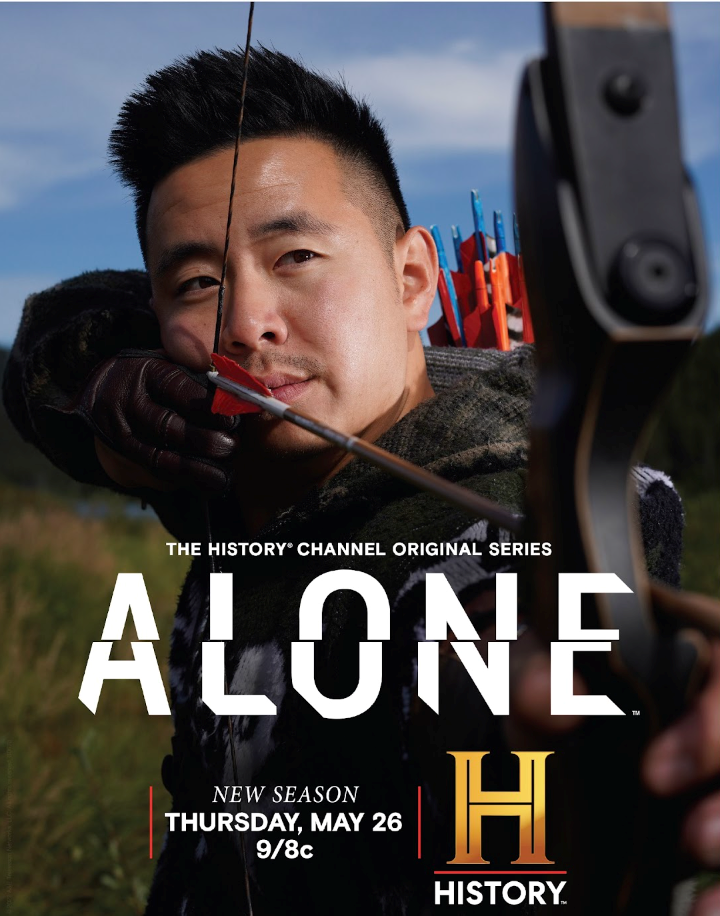
Banner for Alone featuring Teimojin Tan. Source: Instagram.
In the wilderness of Labrador, Canada, WMS member Teimojin Tan, a seasoned physician and survival expert, embarked on a profound journey on the TV show Alone. With a unique blend of medical expertise and deep wilderness knowledge, Teimojin showcased exceptional skills, resilience, and an unwavering spirit. His journey on Alone is a testament to the philosophy that the journey truly is the destination, and the impact we have inspiring others is invaluable.
Teimojin was one of ten contestants on Season 9 of Alone, a reality show that sends contestants alone into the wilderness to survive with only ten items. The one who lasts the most days, wins. Teimojin lasted 63 days, but lost the title of last survivor to Pablo Juan Quinonez, who survived an additional 15 days through fasting and not using energy building a fire , rather than employing superior survival skills. A recent article crowned Teimojin the “should-be” winner due to his demonstration of survival skills including shelter-building, hunting, and fishing. I had the opportunity to interview him and discover more about what makes a true survivor.
Teimojin's story begins in a multicultural household, where he developed a fascination with the natural world. His godfather, a French Canadian with a love for the outdoors, instilled in him a curiosity and passion for nature: “He descended from a line of frontiersmen and people who love being outdoors,” Teimojin explained. “He provided the biggest service to me inspiring that curiosity and instilled that desire just to be out there”. This early influence led Teimojin to explore various outdoor activities, including mountaineering, deep-sea diving, and solo traveling.
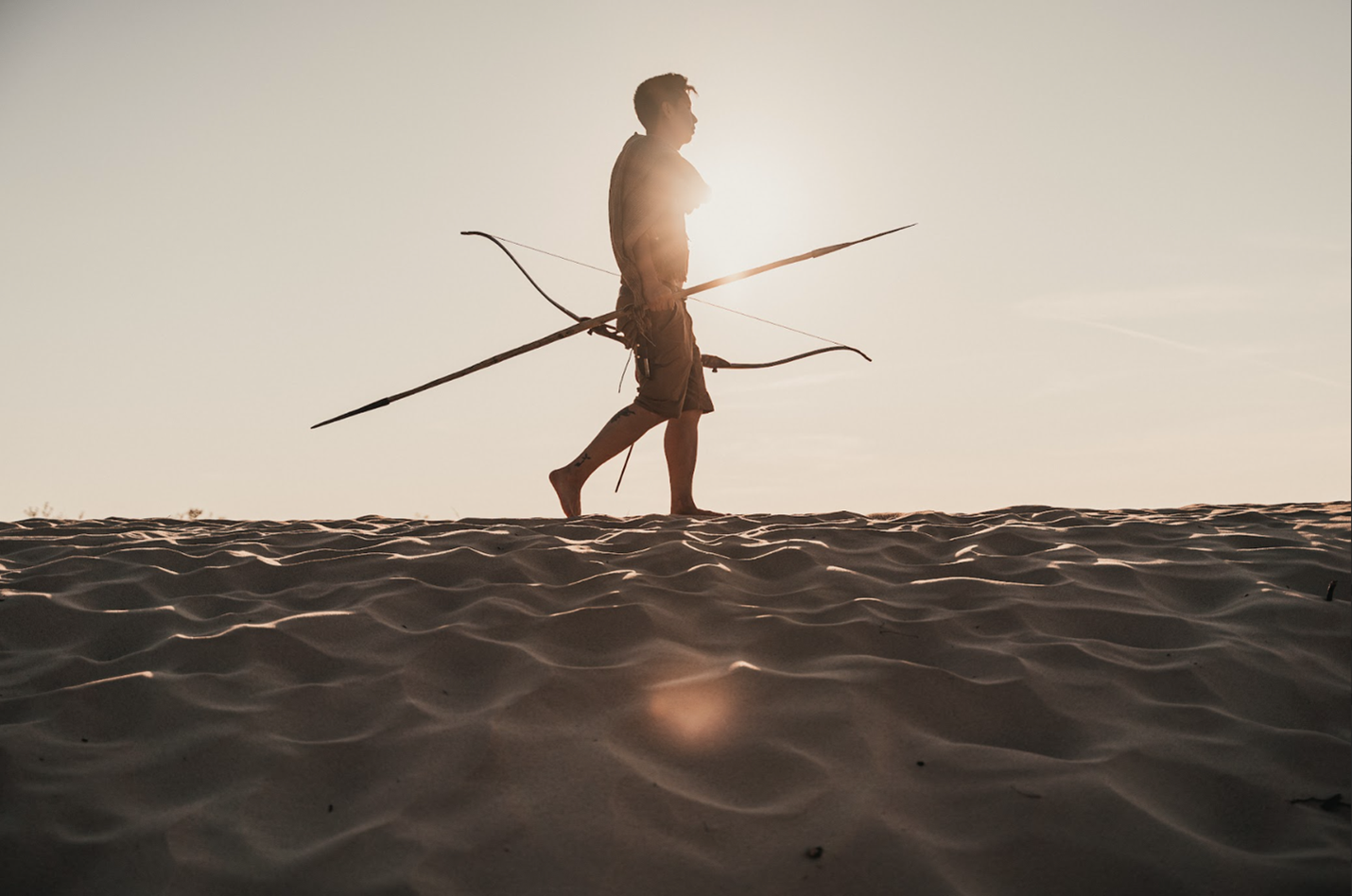
Teimojin Tan with bow and spear. Source: Teimojin Tan.
Before venturing into the wilderness, Teimojin had a diverse professional background. He went to medical school and specialized in Family Medicine with additional training in Emergency Medicine. His military experience further honed his survival skills and mindset. “The contrasting mindsets that I gained from living with indigenous people and training in the Army, helped me find a middle ground, especially as a physician.”
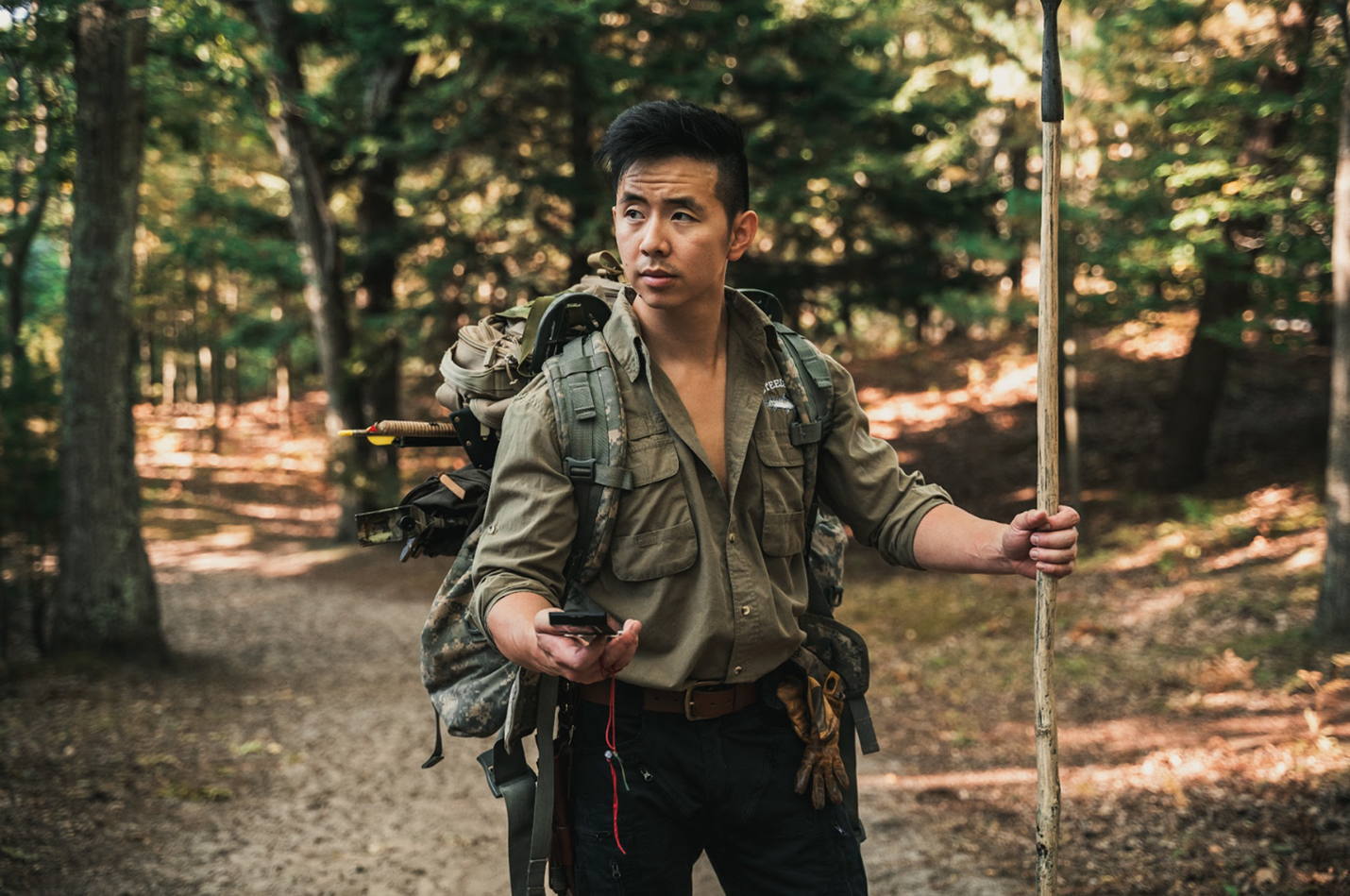
Teimojin Tan using a compass. Source: Teimojin Tan.
What inspired you to participate in the popular TV show Alone?
“It was funny because the reason to go to the show was completely different than the reason to stay in the show, which I found interesting in retrospect.”
The original impetus to participate was to test his skills and training. Tan left the show after 63 days and considerable soul searching. He felt compelled to leave while he still had the strength to carry himself out. His hope was to remind his mother of the strength she had taught him and to inspire courage to improve her own health. Teimojin's preparation for Alone was rigorous. He knew that success depended on his ability to apply his diverse skill set in extreme conditions. The challenges he faced on the show were numerous, from isolation to starvation. However, his resilience and adaptability shone through.
What was one of the things you brought with you for which you were most grateful?
“Salts! A big reason why people ‘tap out’ or get extracted is because of gastrointestinal issues - people puking a bunch - having diarrhea - then feeling lightheaded, fainting, and injuring themselves. So when I saw ‘salts’ as a potential item, I asked them to clarify this and they just said ‘salt’.” Teimojin’s medical background played a crucial role in his survival strategy: he chose from the potential items list a medical ration combining rice, sugar, and salt, which helped him stay hydrated and maintain his strength during periods of illness. “I basically made the oral rehydration salt mix - and included some magnesium - and with the salt and sugar emergency ration, I had the support to be sick for 14 days then hit the ground running without significant dehydration or electrolyte depletion. Alternatively, rice is very palatable, easy to digest with simple starches and amino acids, and just the rice water alone can be used for rehydration and has been a backup rehydration solution in developing countries without access to rehydration salts.”
One of the most significant challenges was hunting, a skill he had not mastered before the show. Initially relying on fishing, Teimojin had to switch to hunting due to changing conditions. This experience was transformative, teaching him the value of gratitude and the harsh realities of survival.
You had never hunted before. How was that transition?
“We can always be grateful for food and all of our resources - but I think once you're at that point of starvation - when you're literally kind of at the breaking point mentally, physically, emotionally - and then you get that relief. It is just something that's such a huge blessing.”
What was your favorite meal out there?
“I had grouse jerky that I had covered in salt and sugar and that was incredibly tasty, even right now - tastier than some of the store-bought jerky that I've had.”
You could open up an Alone kitchen!
“Yes! I remember on Thanksgiving, I had a pot of rice porridge with reindeer moss, cranberries, and grouse, which was very very delicious. I seasoned it with salt and sugar. Delicious. And it filled a two quart pot - that's how much food I had on Thanksgiving when I was out there and it was such a cool celebration.”
If I look in your pack right now, what are the three most crucial things I am most likely to find?
“My go bag - when we're thinking about those spur of the moment adventures - it’s less about bringing everything under the sun”, but rather bringing key items relevant to your survival priorities. Signaling is a huge priority within the first 24 hours of a survival situation or medical emergency. I'll bring some fire making materials to make signals and to stay warm. I normally have my phone with a downloaded map of the area and bring my Garmin satellite communicator as a back-up. Lastly, I almost always bring a mylar tarp - not a space blanket - but a mylar tarp, because it can be used as a legitimate shelter. A lot of the ones that you get in your first aid kits will puncture and rip really easily.”
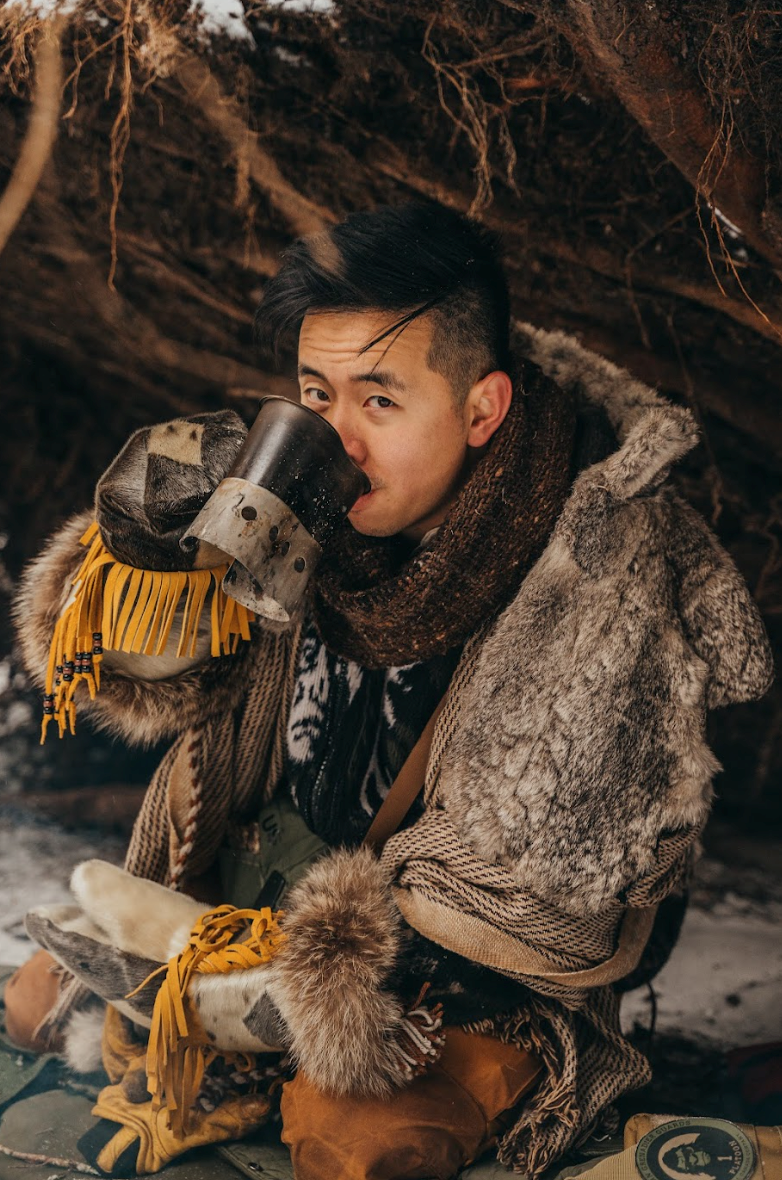
Teimojin in his shelter while filming the show Alone. Source: Teimojin Tan.
Teimojin's journey on Alone taught him profound lessons about resilience, adaptability, and the importance of living in the moment. He emphasized the significance of the journey itself, rather than the end goal. "It’s about maintaining a message of inspiration," he said. This realization shifted his perspective and allowed him to appreciate each moment fully. “I've been very grateful for that. At the end of the day, one of the beautiful things of being a healthcare provider is connecting with other people on that deep and vulnerable level.”
Teimojin's journey has inspired many. His story resonates with viewers, sparking curiosity and a desire to explore the natural world. Testimonials from fans highlight how his calm demeanor and thoughtful approach have helped them through personal challenges. His influence extends beyond the show, as he continues to educate and inspire through his platform, Survival Doctors, which started as a keepsake for his children but has grown into a community focused on medical independence and self-reliance. "It's about using the outdoors to instill confidence and self-reliance in our families," Teimojin shared. “Fluidity. I think fluidity breeds resilience. If you learn to just roll with the punches, you will find it easier to weather life’s storms with grace and compassion towards yourself and others.”
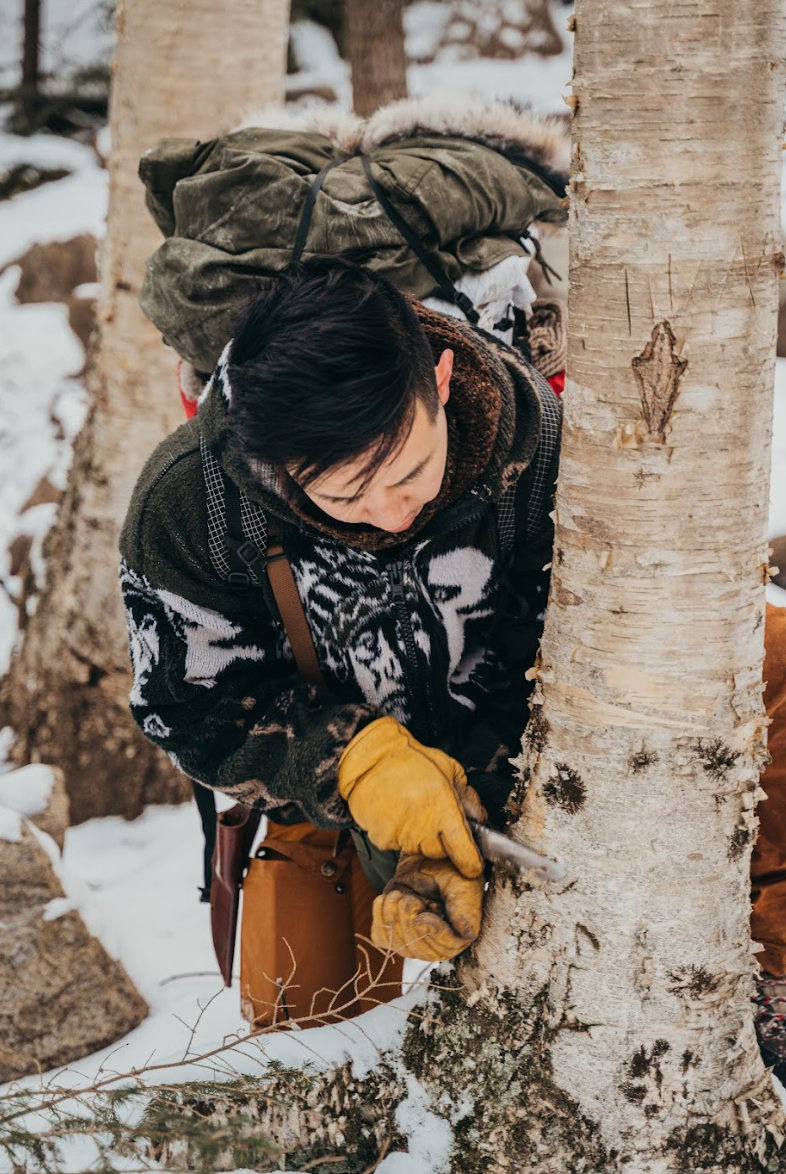
Teimojin Tan collecting birch bark. Source: Teimojin Tan.
One of the most touching aspects of Teimojin's journey was his motivation to inspire his mother, who was struggling with health issues. His experience on Alone became a means to show her how much he cared and to encourage her to improve her health. "The reason why I left the show was because my message could not have been established if I left via being pulled or left in a stretcher," he explained. “I had to leave on my own.”
“I looked back at my training - both in the military and through medical school - it was so disheartening to see how absent I've been in my family life. My mom was going through a lot of medical things - and she still is - and to be that absent was heartbreaking at that time. To see her change as a person over time - over what seemed like a blink of eye but was actually a decade - and it became my purpose to try to inspire her to change her health and to help her see how much I love her and how much I hope that her health trajectory would change.”
Balancing his roles as a physician, survival expert, public figure, husband, and future father is no easy feat. Yet, Teimojin finds joy and fulfillment in his various responsibilities. "It takes a lot of work and effort to be good at all these roles, but it's worthwhile, so it doesn't feel like work," he said.
Teimojin is excited about upcoming projects with Survival Doctors, including hybrid and online education programs and in-person expeditions. These initiatives aim to teach students survival skills and medical knowledge, emphasizing the importance of self-reliance and preparedness. “I'm trying to make as many survival doctors as possible.”
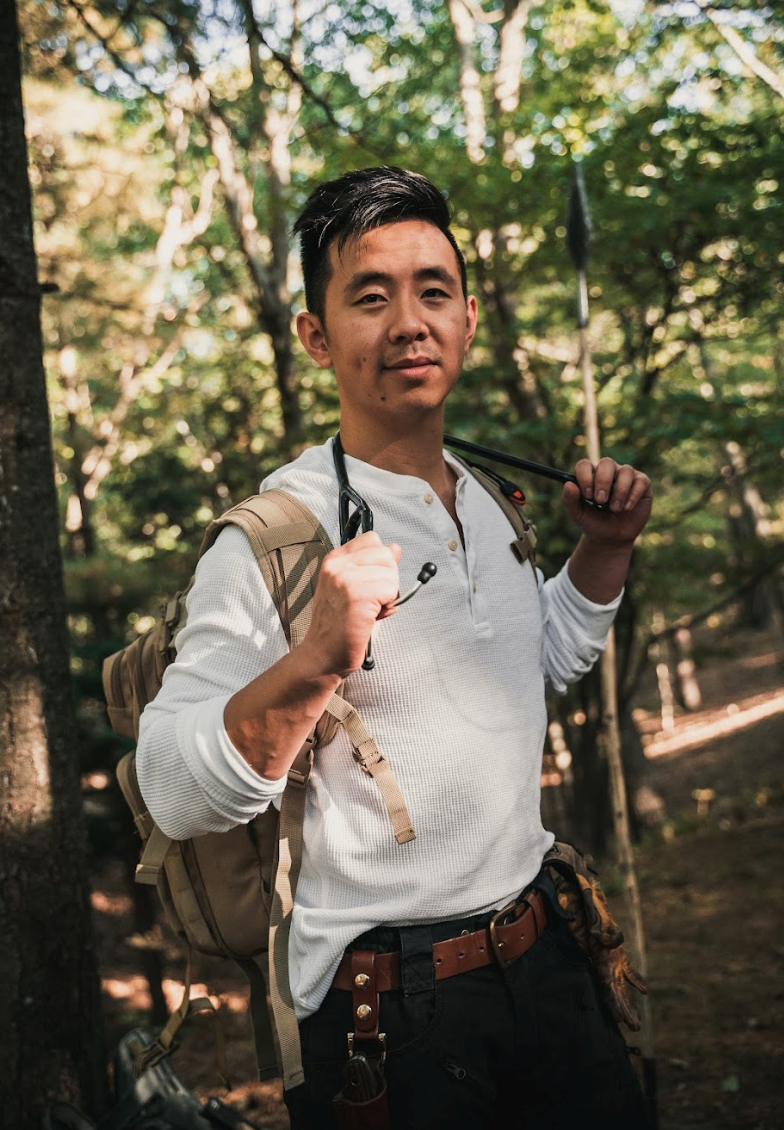
Teimojin Tan prepared with a stethoscope in the wilderness. Source: Teimojjin Tan.
As Teimojin looks to the future, he remains committed to educating and inspiring others. His journey is a testament to the strength of the human spirit and the enduring power of inspiration. In a world often focused on the end goal, Teimojin's story reminds us to cherish the journey and the lessons we learn along the way.
If you want to find out more about what Dr. Teimojin Tan is doing, check out www.survivaldoctors.com
The WMS also hosted a watch party and Fireside Chat with Dr. Tan, and we welcome you to check out the recording.